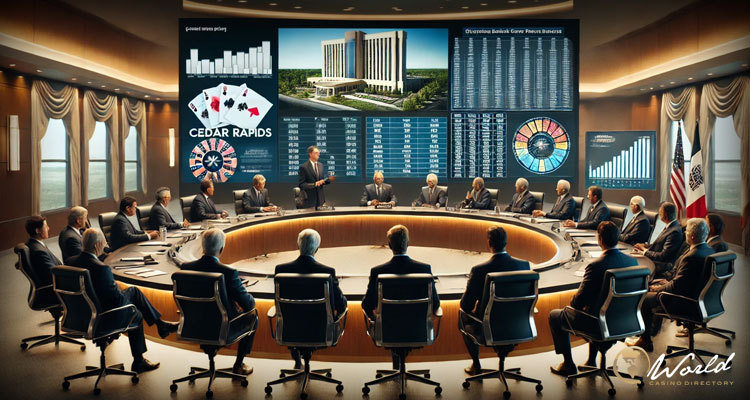In a recent push to advance local development, Cedar Rapids city officials presented a compelling case for a new casino project during a meeting with Iowa’s gaming authorities. This initiative, driven by the joint efforts of Peninsula Pacific Entertainment and the Linn County Gaming Association, centers around a $275 million development plan for the Cedar Crossing Casino & Entertainment Center.
Economic promise and community benefits highlighted:
The proposal, unveiled at the regular meeting of the Iowa Racing and Gaming Commission in Bettendorf, outlines a casino equipped with 700 slot machines and 22 table games. Planned amenities include a 1,500-seat entertainment venue, a selection of restaurants and bars, an arts and cultural center, and a family-friendly STEM lab, positioning the project as a multifaceted entertainment hub.
Local leaders are optimistic, emphasizing the potential for significant economic and social benefits. Cedar Rapids Mayor Tiffany O’Donnell pointed to robust public support and the project’s potential to drive community growth and revitalization, particularly in areas still recovering from the severe floods of 2008. “They recognize this isn’t just about gaming, it is about growth opportunities and the revitalization of our community,” she said, as The Gazette reports.
The economic forecasts for Cedar Crossing are promising, with projected annual revenues exceeding $100 million. This includes an anticipated $80 million in new state revenue, suggesting substantial market expansion without significant detriment to existing casinos. According to studies presented by Convergence Strategy Group, other regional casinos are expected to experience only modest revenue declines, marking a departure from earlier concerns about market saturation.
Suzanne Leckert, a consultant for the project, stated: “The impact on existing facilities is something that we looked at very closely. That’s why we took the extraordinary steps that we did. In this case, previous studies overestimated the impact of a Cedar Rapids casino on existing markets.”
The proposal also benefits from demographic and economic shifts, including notable population growth and increased gaming revenues across the state, which underscore an untapped demand in the regional market.
State and local perspectives on the casino proposal:
Despite previous setbacks in 2014 and 2017, where concerns over revenue cannibalization halted progress, updated data and revised projections have reinvigorated efforts. The current proposal leverages recent changes in market conditions and legislative frameworks, aiming to position Cedar Rapids as a competitive player in the gaming industry.
The commission plans to conduct a detailed review, including a site visit and public commentary sessions, before making a final decision. The anticipation builds towards a definitive vote scheduled for early next year, which could end a longstanding debate over the casino’s potential impact.
The project promises substantial community contributions, including significant tax revenues and a commitment to local non-profits, with plans to allocate double the state-mandated percentage of net revenues to social causes. This commitment is seen as a pivotal element of the project, reflecting a broader strategy to integrate the casino into the fabric of Cedar Rapids’ economic and cultural life.



